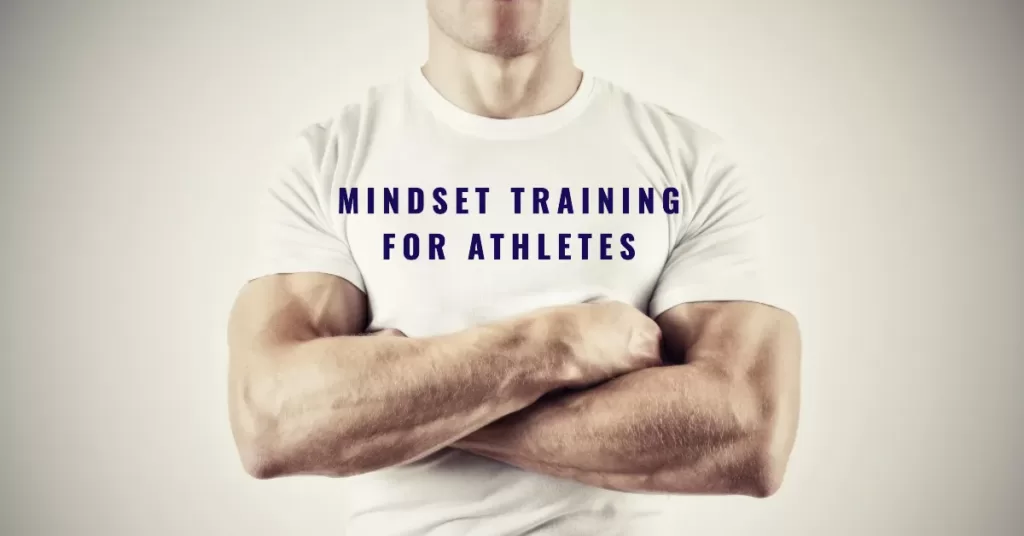Are you a young athlete looking to take your game to the next level? Mental conditioning can be the key to unlocking your full potential on and off the field. Your mindset, or the way you approach challenges and setbacks, plays a crucial role in your sports performance.
By developing a growth mindset, learning techniques for controlling negative thoughts and emotions, building mental toughness, fostering confidence and focus, and applying mindset training to life beyond sports, you can improve not only as an athlete but also as a person. This article will provide practical tips and strategies for young athletes who want to train their minds for success. Get ready to take control of your mindset and unleash your limitless potential!
Table of Contents
Key Takeaways
- Developing a growth mindset can improve sports performance and personal development.
- Techniques for developing a growth mindset include setting challenging but achievable goals, seeking feedback, and practicing positive self-talk.
- Mindset affects physical abilities, mental toughness, and how one approaches training and competition.
- Confidence and focus can be cultivated through practice, positive self-talk, visualization techniques, eliminating distractions, and effective goal setting.
Understanding the Importance of Mindset in Sports Performance
Understanding the importance of mindset in sports performance is key to unlocking an athlete’s full potential, and it’s like adding fuel to a fire that can lead to greatness. Your mindset affects everything from your physical abilities to your mental toughness. It’s what sets apart the champions from the mediocre players. When you have a positive and determined mindset, you are more likely to push through tough times, keep going when things get hard, and bounce back quickly after setbacks.
Your mindset also affects how you approach training and competition. If you see challenges as opportunities for growth rather than obstacles that hold you back, you’re more likely to be open-minded about trying new things and taking risks. This willingness to explore new ways of doing things can help you find solutions that others may overlook or not even consider.
A positive mindset also helps build resilience, which is essential in sports where injuries are common and setbacks happen frequently. Resilience means being able to adapt quickly when faced with adversity, learning from failure instead of getting discouraged by it, and bouncing back stronger than before. With a resilient mindset, athletes can overcome any obstacle they face on their path toward success.
Understanding the importance of mindset in sports performance is crucial for young athletes who want to achieve their full potential. A positive attitude combined with determination will help them push through tough times, embrace challenges as opportunities for growth, and develop resilience in the face of adversity. So if you want to unlock your true potential as an athlete, start cultivating a growth-oriented mindset today!
Developing a Growth Mindset
By embracing challenges and learning from mistakes, you can develop a growth mindset that will help you improve your sports performance. A growth mindset is a belief that your abilities can be developed through hard work, dedication, and persistence. It’s important for young athletes to understand this because it allows them to see their potential and not give up when faced with obstacles.
To develop a growth mindset, start by setting goals for yourself. These should be challenging but achievable so that you can push yourself to improve. When you encounter setbacks or failures, view them as opportunities to learn and grow instead of giving up. Remember that success is not just about natural talent – it’s also about effort and perseverance.
Another way to develop a growth mindset is by seeking out feedback from coaches, teammates, and other trusted sources. This feedback can help you identify areas for improvement and provide guidance on how to make progress. Don’t be afraid of constructive criticism – use it as motivation to keep working hard and getting better.
Practice positive self-talk to reinforce your growth mindset. Instead of negative thoughts like “I’m not good enough”, focus on affirmations like “I am capable of improving with effort”. By changing the way you think about yourself and your abilities, you can build the confidence needed to reach your full potential in sports (and beyond).
In essence, developing a growth mindset is essential for young athletes who want to improve their sports performance. By setting challenging goals, embracing challenges as opportunities for learning, seeking out feedback from trusted sources, and practicing positive self-talk, you can expand your abilities and achieve success both on and off the field/court/mat/etcetera!
Techniques for Controlling Negative Thoughts and Emotions
Just like a surfer riding the waves, you can learn techniques to navigate and control negative thoughts and emotions in sports.
Here are some practical tips that can help you achieve this:
- Recognize your triggers: Identify what situations or events make you feel anxious or upset during a game. Once you recognize your triggers, it’s easier to anticipate them and prepare yourself mentally.
- Reframe negative thoughts: Negative thoughts can spiral out of control if left unchecked. Learn to reframe them into positive statements that encourage you instead of discouraging you. For example, instead of thinking “I’m terrible at this”, try thinking “I’m improving every day.”
- Use relaxation techniques: Deep breathing exercises, visualization, and progressive muscle relaxation are all effective ways to calm your mind and body during high-stress moments. Practice these techniques regularly so they become part of your pre-game routine.
- Focus on what you can control: There will always be factors outside of your control in sports. Instead of dwelling on those things, focus on what you can control – your effort, attitude, and preparation.
Remember that controlling negative thoughts and emotions takes practice just like any other skill in sports. Be patient with yourself as you learn these techniques and don’t give up if they don’t work immediately. Keep practicing until they become second nature to you. With time and dedication, you’ll be able to ride the waves of negative thoughts and emotions with ease.
Building Mental Toughness

Are you ready to take your mental game to the next level? In this section, we will discuss two crucial aspects of building mental toughness: developing resilience and grit, and handling pressure and stress. Resilience and grit are essential qualities for any athlete who wants to succeed in the face of adversity. We’ll explore practical strategies for strengthening these traits. Additionally, we’ll provide tips for managing pressure and stress so that you can perform at your best when it counts the most. Get ready to develop a mindset that will help you achieve your athletic goals!
Developing Resilience and Grit
You can strengthen your resilience and grit by facing challenges head-on and persisting through adversity, like a rock climber scaling a difficult route. It’s important to understand that setbacks are not failures, but rather opportunities for growth and learning.
Here are some practical tips to help you develop resilience and grit:
- Take on challenges that push you out of your comfort zone
- Learn from mistakes instead of dwelling on them
- Surround yourself with supportive people who encourage you to keep going
Remember that developing resilience and grit is a process, not an overnight transformation. But with practice and perseverance, you can cultivate these qualities within yourself and become better equipped to handle whatever life throws your way. So don’t be afraid to take risks, embrace failure as part of the journey, and keep climbing toward your goals.
Handling Pressure and Stress
When the heat is on and life feels like a pressure cooker, it’s easy to feel like you’re drowning in stress. But remember that pressure can actually bring out your best flavors if you learn how to steep in it. As a young athlete, it’s essential to know how to handle stress and pressure because these are inevitable aspects of sports.
To better understand how to handle pressure, let’s take a look at this table:
| Pressure | Response |
|---|---|
| Negative self-talk | Replace negative thoughts with positive ones |
| Overthinking | Focus on the present moment and trust your training |
| Fear of failure | Embrace mistakes as opportunities for growth |
By recognizing the different forms of pressure and having strategies to deal with them, you’ll be better equipped to perform under stressful situations. Remember that even the most successful athletes have moments where they feel overwhelmed by the intensity of their sport. The key is learning how to channel that energy into positive action rather than letting it consume you.
Fostering Confidence and Focus
As a young athlete, it’s crucial to cultivate confidence and focus in order to perform at your best. Confidence is the belief in oneself and one’s abilities, while focus is the ability to concentrate on the task at hand without being distracted by external factors. When you are confident and focused, you can perform at your peak level and overcome any obstacles that come your way.
One way to foster confidence and focus is through positive self-talk. This means using affirmations such as “I am capable” or “I am strong” to boost your self-confidence. Additionally, visualization techniques can help you imagine yourself succeeding in competitions or games, which can increase your confidence levels. To improve focus, it’s important to eliminate distractions such as phones or other electronics during training sessions.
Another key aspect of building confidence and focus is setting achievable goals for yourself. These goals should be specific, measurable, attainable, relevant (to your main objective), and time-bound. By setting these types of goals for yourself, you have something tangible to work toward that will help keep you motivated and on track.
Practicing mindfulness can also aid in developing both confidence and focus. Mindfulness involves being present in the moment without judgment or distraction. It allows athletes to stay focused on their training sessions while also helping them remain calm under pressure during competitions.
All in all, cultivating confidence and focus is essential for young athletes who want to perform at their best. By incorporating positive self-talk techniques, visualization exercises, goal-setting strategies, and mindfulness practices into their training regimen – young athletes can develop a winning mindset that will set them up for success both on and off the field of play!
Applying Mindset Training to Life Beyond Sports
You’ve learned how to foster confidence and focus in yourself as a young athlete. But the power of mindset training extends far beyond sports. It’s time to apply this same level of focus and discipline to your life outside of athletics.
First, take a step back and consider what goals you have for yourself beyond sports. Whether it’s academics, relationships, or personal growth, mindset training can help you achieve success in any area of your life.
Once you have identified these goals, create a plan for how you will approach them with the same dedication and mental toughness that you bring to your athletic pursuits. Use the techniques you have learned through mindset training to stay focused on your objectives and overcome any obstacles that may arise.
Remember that mindset is not just about achieving specific outcomes; it’s about developing a resilient attitude toward life itself. By applying the principles of mindset training to all areas of your life, you can cultivate an unshakeable sense of purpose and direction that will serve you well long after your days as a young athlete are over.




